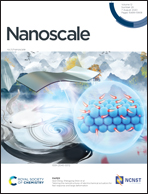Variable-temperature activation energy extraction to clarify the physical and chemical mechanisms of the resistive switching process
Abstract
This study investigates the physical and chemical mechanisms during the resistive switching process by means of obtaining the activation energy in the reaction procedure. From the electrochemical and electrical measurement analysis results of HfO2-based resistive random access memory (RRAM), it can be observed that the chemical reaction during the reset process is consistent with the first-order reaction law. The activation energy, Ea, is determined from the reaction rate constant k under a varying-temperature environment in the reset process. The whole reset chemical reaction process can be divided into five phases involving N–O bond breaking, O–O bond breaking and triple-step oxygen ion migration. The methodology of the activation energy determination carried out in this study showcases a distinct approach to elucidate the resistive switching mechanism of RRAM and offers insight into RRAM design for future potential application.



 Please wait while we load your content...
Please wait while we load your content...